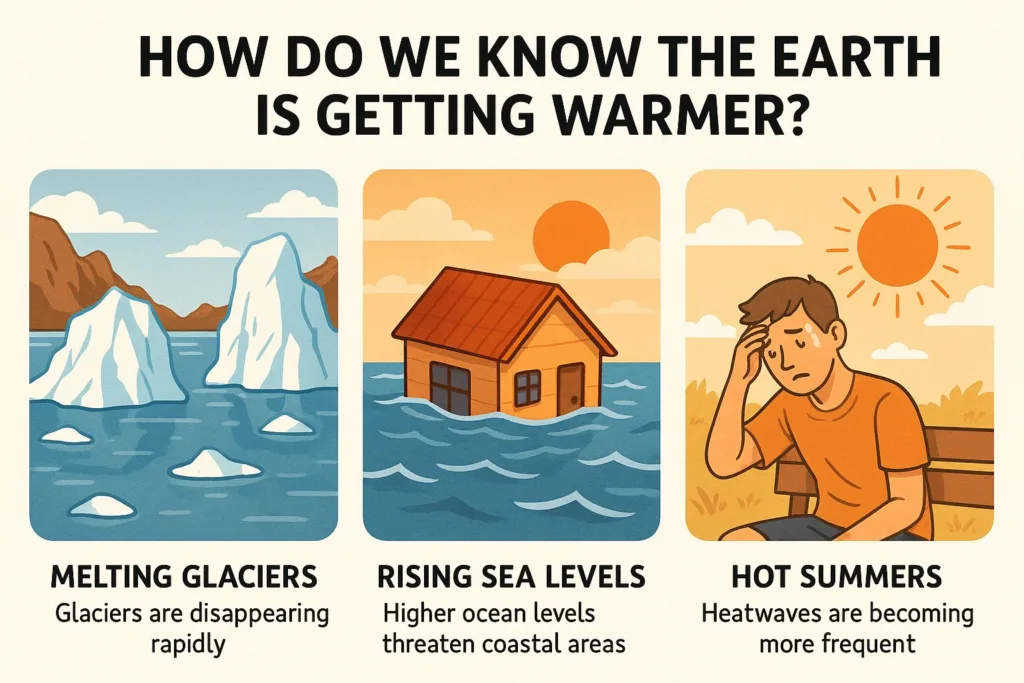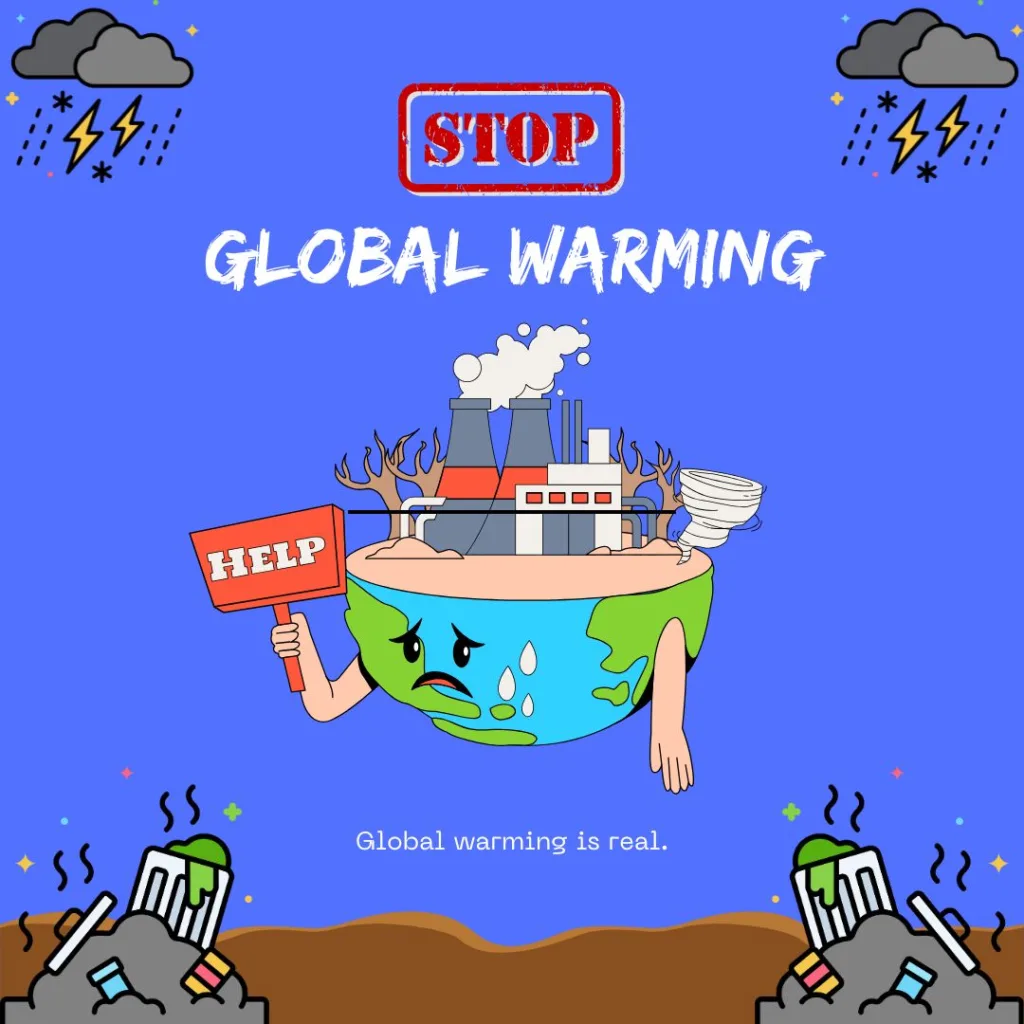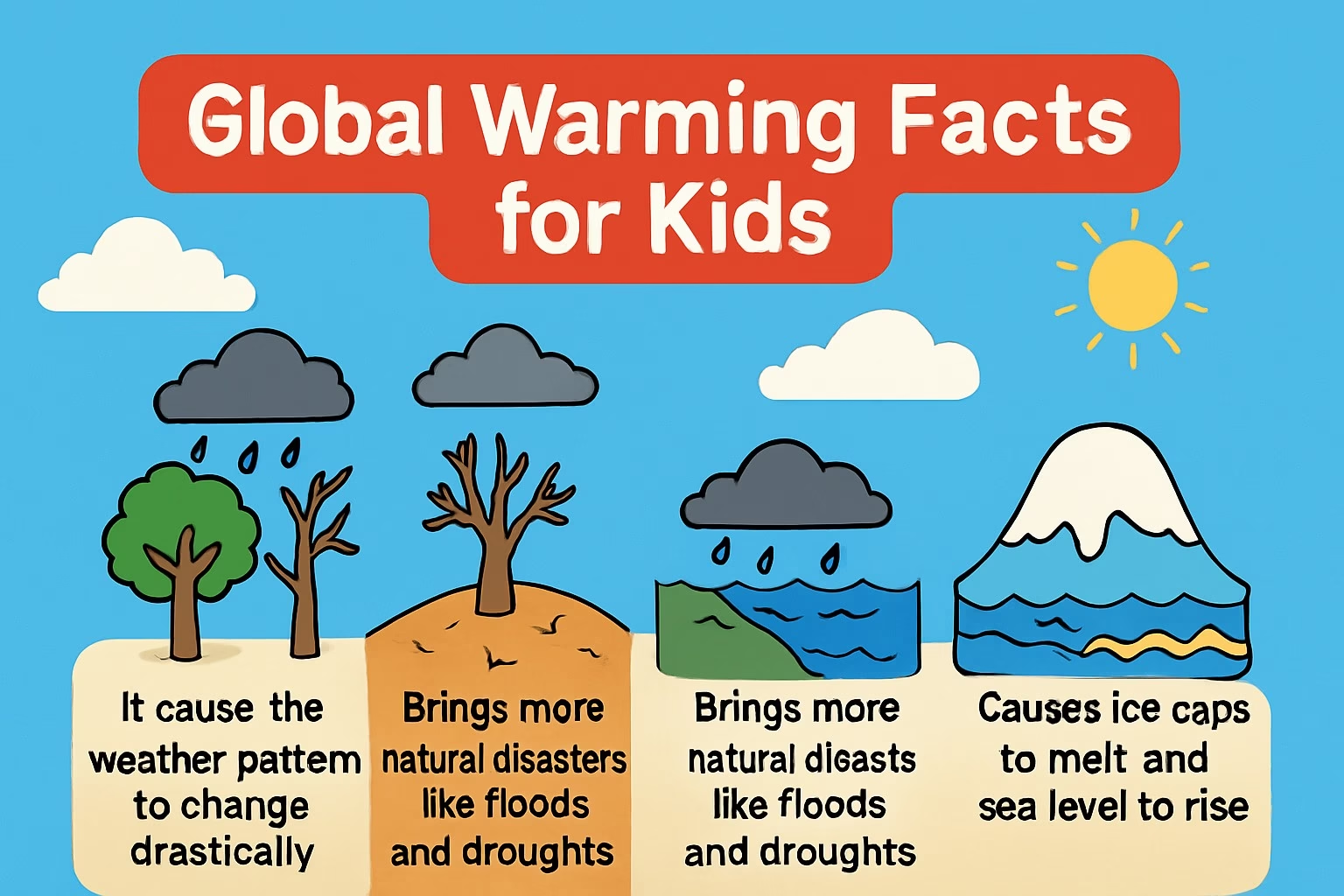Introduction – What Is Global Warming?
Global warming is defined as the average air temperature increasing over time. This means the Earth keeps getting hotter and hotter. This article will explain Global warming and how children can help reduce its impact on the Earth. The phenomenon was first recorded in the 19th century and has been increasing rapidly; It is estimated by scientists that the ocean began to warm from the 1830s.
Did you know Global warming affects a lot of things in our everyday life?
- It causes the weather pattern to change drastically.
- Brings more natural disasters like floods and droughts.
- Causes Ice caps to melt and sea level to rise.

Global Warming Facts for Kids (KS2)
What Causes Global Warming?
Global warming occurs for a lot of reasons, like:
- Greenhouse Gases:
- Carbon Dioxide
- Methane
- Water vapor
- Ozone
- Nitrous oxide
- Chlorofluorocarbon
Greenhouse gases are defined as gases in the air that trap heat. There are six greenhouse gases and they cause the Earth to become warmer (Global warming).

- Deforestation (Cutting down forests):
Trees absorb carbon dioxide(CO2) and provide us with clean air. When we cut down trees, they release the carbon that they store. This causes greenhouse gases to increase and leads to Earth becoming warmer, hence, causing global warming.
- Overconsumption (Consuming a lot of products):
Look around you and think about the products you are surrounded by.
- Your study chair and table are made from wood or plastic.
- Your pencils are made from wood and your books use the same trees.
- Your lunchbox is made from plastic and so are your toys.
Everything around us has gone through an extensive process to be created. The process of creation causes greenhouse gases to be released.
- Burning Fossils Fuels (Coal, oil, gas):
When we burn fossil fuels like coal, oil or gas, it releases greenhouse gases which trap heat. The trapped heat causes the Earth temperature to increase, leading to global warming.
What Are Greenhouse Gases?
Greenhouse gases are defined as gases that trap heat in the atmosphere. There are six greenhouse gases:
- Carbon Dioxide
- Methane
- Water vapor
- Ozone
- Nitrous oxide
- Chlorofluorocarbon
How Do We Know the Earth Is Getting Warmer?
There is a lot of research that is conducted every single year to determine the Earth’s environment and how it is changing. Besides research we can also feel and see these changes around us or on the news:
- Melting glaciers: If you live around an area covered in glaciers then you might see how drastically these glaciers are disappearing. How flooding in your area occurs more often due to the weather changes.
- Rising sea levels: When glaciers melt the water from it adds up to the sea level. This causes the sea level to rise and islands like the “Maldives” to be threatened by the rising sea.
- Hot summers: You might have felt this yourself, every year summer becomes hotter and hotter, you don’t want to go out and play because of the heat. Heatwaves occur more than often which is a sign of global warming.

Global Warming vs. Climate Change
| Global Warming | Climate Change |
| Defined as the temperature rising of the Earth. | Defined as changes in the weather patterns over time. |
| This focuses on temperature changes. | This focuses on storm intensity, weather change and precipitation patterns. |
| Focuses on Earth’s long term increase in temperature. | Includes both warming and cooling effects in areas. |
How Does Global Warming Affect Animals and Nature?
Global warming not only affects humans but animals as well.
- Polar bears lose icecaps which is their hunting ground for food.
- Coral reefs start to bleach due to the warm temperature of the water.
- Animals migrate more often and change habitats to adapt to the increasing weather.
- Wildfires occur due to global warming. It causes animals to die and lose their habitat while trees are damaged as well.
How Does Global Warming Affect People?
Global warming affects many people around the world in various ways, like:
- Heatwaves during the summer can cause people to faint or not leave their house.
- Agriculture becomes difficult with a hotter climate as many plants are not able to adapt to the heat and die. This causes difficulty for farmers and for people who depend on them.
- Floods and droughts increase due to global warming as higher temperature disrupts water cycles and causes irregular floods and droughts.
What Can Kids Do to Help?
There are a lot of activities that children can be a part of to help reduce global warming. Here is a list of things children can do and remember:
- Reuse, Reduce, Recycle the things they own.
- Save electricity by turning off extra lights.
- Walk or cycle to places more often than using cars or buses.
- Learn how to recycle paper from already used material (Recycling).
- Learn about global warming and climate change. Education makes you understand how you can help!
- Create a fun checklist of things that you can do every day to slow down global warming.
Can We Stop Global Warming? – Conclusion
Yes, it is never too late to stop issues in the world like global warming. Global warming is occurring at a rapid pace but we still have time to help the planet and ourselves. Children always remember that learning and talking about the issues in this world inevitably leads to change.

Checklist That Children Can Follow
You can try to contribute to these changes soon, by taking actions like:
- Being part of tree plantations with your guardians.
- Donating old toys, books or clothes when you outgrow them.
- Think carefully about what you buy.
- Not wasting water while brushing your teeth or washing the dishes.
- Cycling or walking when you can instead of being driven by your parents.
Global Warming Facts for KS2 Kids
- You probably didn’t know that cows release a gas called “methane” due to digestive processes.
- Did you know that one mature tree absorbs roughly up to 22kg of CO2 every year?
- Human activities cause the most global warming.
- Did you know heatwaves occur due to global warming?
- Scientists started learning about global warming and climate change as early as the 1820s.
Frequently Asked Questions About Global Warming
Is it too late to stop global warming now?
No, it’s never too late to start making a change. The earth is very adaptable, so are humans and animals. So if we start fixing the issue of global warming now it can lead to a better future for everyone, including you and me!
Why is every year hotter than the last?
Research suggests that the overall temperature in the world keeps on increasing every single year.
Which places on Earth experience the consequences of global warming?
The entire Earth faces the consequences of global warming. All life on earth is affected, from humans, animals and plants.
What is CO2 and what does it do to the Earth?
CO2 stands for Carbon dioxide which is a gas that traps heat ( a greenhouse gas). When CO2 increases on the planet due to activities like burning fossil fuel (coal, oil, natural gas) or natural events like a volcano erupting, it causes the Earth to become hotter as it traps heat.
External Links
- NASA Climate Kids – What is Global Warming?
https://climatekids.nasa.gov/global-warming/ - Smithsonian Magazine – When Did Global Warming Start?
https://www.smithsonianmag.com/science-nature/when-did-global-warming-start-180964450/ - EPA – Causes of Climate Change
https://www.epa.gov/climatechange-science/causes-climate-change - NOAA – What are Greenhouse Gases?
https://www.climate.gov/news-features/understanding-climate/climate-change-atmospheric-carbon-dioxide - NASA – What’s the Difference?
https://climate.nasa.gov/faq/12/whats-the-difference-between-climate-change-and-global-warming/

